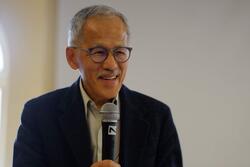Perfect Storm: A #TrusteeTuesday Reflection
 By Don Ng (MDiv ‘75)
By Don Ng (MDiv ‘75)Today’s convergence of earth-shattering events reminds us of a “perfect storm.” It’s interesting that we call it “perfect” when almost everything we come to expect and rely on has been disrupted—far from anything perfect.
Human beings are creatures of habit. We like to have agendas, schedules, calendars and routines to remind us that life is predictable and familiar. But at the same time, while we clock in and out, meet the sunrise on our faces and have the sunset on our backs or even enjoy each season with its unique attractions, we believe in the sense that there’s some permanence. The sand is not necessarily shifting under our feet. But when a perfect storm comes, we are knocked off our false sense that we are standing perfectly still and the world is swirling all around us.
Traditional Western theology articulated by theologians and reflected in our religious institutions has been the standard of scholarship for many years until the post-modern era and the emergence of liberation theology. What was referred to as canon is now seen as only one of many truths. Like the world with all of its differences, our canon is not the only orthodoxy.
In light of these realities, I offer three thoughts.
1. Faith Stories
Since God has converted each person, a seminarian comes with his/her faith story from a particular tradition. In the past, we have joked about someone’s faith would be lost or at least shaken when coming to seminary. Whether the person hails from a more evangelical or a progressive theological background, these core faith roots are in place and the seminary’s objective is to expand the seminarian’s understanding and appreciation of other faith traditions. For these others hold truths as well. This exposure prepares the seminarian from their own particular faith story to be ecumenical, inter-faith conscious, globally aware and a long view of history. Andover Newton’s Baptist and Congregational roots afford such personal endeavors in “soul liberty.”
2. Self-Awareness
Especially for persons who derive from the majority culture, the opportunity to understand oneself can be rare. For most people of color, the task of “knowing one’s place” in the world is necessary for survival. In today’s Black Lives Matter movement, more people are learning about white privilege, systemic and structural racism. When seminarians are aware of one’s own heritage, race, and culture along with inherent biases, they would be more sensitive and effective in relating and ministering to people who are both similar as well as different from themselves. Rigorous Clinical Pastoral Education is one program that helps seminarians to understand oneself. Intercultural opportunities such as Border Crossings immerse persons to become
self-aware.
3. Adaptive Skills
Covid-19 has disrupted the entire world’s systems forcing everyone to adapt to new practices to become new habits. Like “survival of the fittest,” those religious leaders who are able to quickly and confidently adapt to the new normal will survive. Teaching and developing adaptive skills in seminarians such as remote learning would prepare leaders when the next paradigm shift comes.
In regards to a seminary’s requirements to have a “core curriculum,” there may still be as such but for a relevant seminary to exist in the future, whatever is deemed core or central needs to be regularly questioned and revised. Whether we believe it or not, the world is constantly changing and it’s time for us to catch up.
For an explanation of this weekly series, see the announcement on our news feed.
To learn more about our trustees, visit the Trustee page on this site, where you will also find a full bio for Don Ng.
